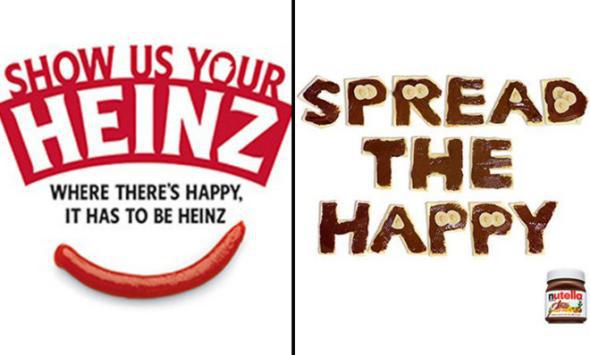A version of this post appeared on The Week:

(Facebook.com/NutellaUSA, Facebook.com/HeinzKetchup)
In marketing, it’s become quite popular to use an adjective as a noun. Take a look at some examples collected by branding expert Nancy Friedman:
Find your fabulous (Thai Tourism and others)
Go directly to fabulous (California Lottery Monopoly Scratchers)
Welcome to fabulous (ULTA)
Welcome to possible (Mindtree)
Rethink possible (AT&T)
In search of incredible (Asus)
15 seconds of smart (Farmers Insurance)
111 years of extraordinary (Bergdorf Goodman)
Celebrate your extraordinary (Sephora)
Give artisanal… Give whimsical… Give local… Give exceptional (Oakland Museum of California)
Generate positive (Sungevity)
The future of awesome (Xfinity)
Where there’s happy, it has to be Heinz (Heinz, of course)
Spread the happy (Nutella)
It’s what happy tastes like (Carvel)
Where better happens (Sears)
Your best beautiful (Olay)
Committed to great since ‘78 (Ben & Jerry’s)
What’s your active? (active.com)
Unlock your more (Fiat)
End the awkward (scope.org.uk)
Some people love these unexpected turns of phrase. Others think of them as the worst kind of linguistic evil.
First off, using adjectives as nouns is nothing new. For instance, we’ve long said “the poor” when we really mean “the poor people.” Also, some adjectives have come to be nouns in their own right, not shorthand for nouns they describe. Evil is one. Jolly, as in “get your jollies,” is a more recent conversion. Some adjective-turned-nouns even name actual, physical substances—fat is a good example of this, an adjective that got borrowed to nounhood a millennium ago and has spread ever since. But the above trend is different. When we “spread the happy,” we aren’t spreading happy people, but rather happiness.
When a word of one part of speech is taken unchanged for use as another—most commonly when we verb something—the linguistic term is conversion. But these marketing usages are not nouning an adjective for simple convenience (as I just did when I verbed the word “noun”). Rather they aim, as so much marketing does, to produce a striking effect. The word for what they’re doing—forcing a word into an unexpected grammatical slot as a rhetorical flair—is anthimeria (also spelled antimeria), as has been pointed out in articles over the past decade by Nancy Friedman, Ben Yagoda, Robert Lane Greene, and others.
Why do this? Because language. Because marketing. Because bisociation!
What is bisociation? It’s an idea given a name by Arthur Koestler in his 1964 book The Act of Creation: In a nutshell, you have two things operating according to two different scripts, and, at the point where they meet, you jump from one to the other. According to Koestler, this notion is central to creativity. Puns are a classic case of bisociation: The humor comes from jumping from one meaning to the other. Metaphors bisociate between two things on the basis of resemblance and often give striking insights and images—think of Edna St. Vincent Millay’s “My candle burns at both ends.” Bisociation tickles your brain, and that’s just what marketers want to do.
But exactly how does the bisociation in this adjective-to-noun anthimeria work?
Consider examples of anthimeria using somewhat different sorts of words in the noun slot: The slogans “Full of Wow” and “Full of Yum,” used by the California-based dairy company Crystal, and the popular use of fail as a noun, as in “epic fail.” In these cases, wow, yum, and fail can be seen as one-word expressions—the first two exclamations, the third something written (or stamped) on a document—used in noun slots. A similar structure is used in “Because X.”
Adjectives are often one-word exclamations: “Fabulous!” “Extraordinary!” “More!” So perhaps we are imagining a kind of quotation: Not just “Find your fabulous” but “Find your ‘fabulous!’” The possibility of being a one-word utterance lends an adjective a thingness. True, this doesn’t hold for all of the words in the above examples. “Happy!” is an uncommon exclamation, for sure. But the concept, once established, gets extended, so that even a word like “positive” can feel thingy when used as a noun. The linguist Neal Whitman has observed that when we talk about “buckets of fail” and “bags of win,” we imagine fail and win as bulk items that can be carried around, which has a bisociative effect like a metaphor. Let’s have a look again at what sort of thing an anthimeric adjectnoun can present:
* It’s a place (fabulous, incredible, more): You can search for it and find it. You can go to it. You can be welcomed to it. It can be unlocked.
* It’s an event (smart, extraordinary, better, awkward): It can be measured in seconds or years. It can happen and it can be ended.
* It’s a substance or energy (artisanal, whimsical, local, exceptional, positive): It can be given or generated.
* It’s a comestible, thick fluid (happy): It can be spread (like fat!) or tasted.
* And, very importantly, it can be yours (your fabulous, your extraordinary, your beautiful, your more). Which means you can be it.
Of course, what’s happening here is not simply an adjective being turned into a noun or, to put it another way, a quality being turned into a thing. More importantly, from the marketer’s perspective at least, the thing being advertised, the product, is turned into the physical embodiment of a quality. Bisociation is a two-way street, after all. Marketers sell the sizzle, not the steak; with these anthimeric adjectnouns, they’re selling the steak as the physical realization of sizzling.
And if you’re wondering what sorts of things tend to go with what kinds of qualities, well, there’s a pattern: Happy = food. Fabulous = leisure. Possible = technology. Extraordinary = fashion. And vice versa, of course.
More from The Week:
The answer to America’s power needs: solar roads
You should need a license to take out a mortgage
How to live happily ever after, according to science